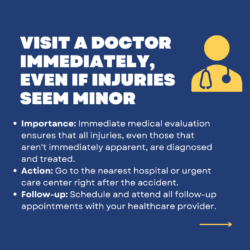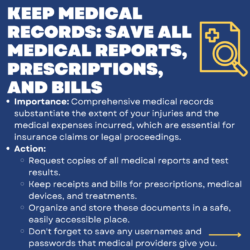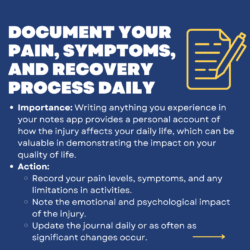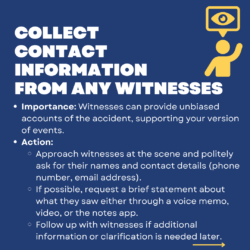If you or a loved one has been injured by a doctor or hospital, Call the Medical Malpractice Crisis Resource Line for Immediate Help >
Free Consultation. Call Now. (516) 394-4200
(516) 394-4200

After an accident, it is crucial to document your injuries thoroughly to ensure you receive the compensation and care you deserve. The aftermath of an accident can be overwhelming, but taking the time to gather detailed evidence of your injuries and the circumstances surrounding the incident is essential. By being proactive and methodical, you can strengthen your claim and protect your rights. This guide will walk you through the necessary steps to ensure your injuries are documented properly, setting the foundation for a successful recovery and any legal action you may need to take. Our skilled attorneys are ready to handle the legal work while you focus on recovery.

Immediate medical evaluation is essential because some injuries may not be apparent but could worsen if left untreated. Going to the nearest hospital or urgent care center right after the accident ensures all injuries are diagnosed and treated appropriately. Additionally, it is important to schedule and attend all follow-up appointments with your healthcare provider. These visits are not only vital for your health but also for documenting your ongoing recovery.

Visual evidence is powerful in personal injury cases and helps establish the severity of your injuries and the circumstances surrounding the accident. Use your phone or a camera to take pictures and videos of your injuries from multiple angles. Also, photograph the accident scene, including any damaged vehicles, road conditions, traffic signs, and any visible hazards or contributing factors. These images can serve as crucial evidence if you decide to pursue a claim.

Save all medical reports, prescriptions, and bills related to your treatment. These documents are essential for substantiating the extent of your injuries and the costs associated with your medical care, which are crucial for insurance claims and legal proceedings. Request copies of all medical reports and test results from your healthcare provider and keep receipts and bills for prescriptions, medical devices, and treatments. Do not forget to organize these documents in a safe place, and be sure to save any usernames and passwords provided by medical providers for online access to your records.

A daily record of how your injury affects your life can be incredibly valuable, providing a personal account that can help demonstrate the impact of the injury on your quality of life. Use your notes app to record your pain levels, symptoms, and any limitations in your activities. Additionally, make sure to document the emotional and psychological effects of the injury. Keeping this journal updated daily, or as often as significant changes occur, will help provide a comprehensive picture of your recovery journey.

Witnesses can provide unbiased accounts of the accident, which can support your version of events in a legal or insurance context. Approach witnesses at the scene and politely ask for their names and contact details. If possible, request a brief statement about what they saw, either through a voice memo, video, or written note in your app. You can follow up with them later if you need additional information or clarification.
If you or a family member has been harmed in an accident, Duffy & Duffy is here to help. Call us today to discuss your case and put your trust in our experienced team. Properly documenting your injuries is crucial for any legal or insurance claim following an accident, and taking these steps can make a significant difference in the outcome of your case.
No. Our injury cases are handled on a contingent retainer. You pay nothing upfront, and we recover attorney’s fees only if your litigation is successful. We don’t bill by the hour. You don’t need to worry about running up a large attorney’s bill before you see any recovery for your injuries.
Yes. Our firm is dedicated to creating a strong relationship with our clients, beginning with keeping your information and consultation confidential.
Each case we encounter is carefully screened and evidence scrutinized to make sure the claim is meritorious and may be successful at trial. We will perform an investigation, and then our partners make a final decision on whether to take on a case.